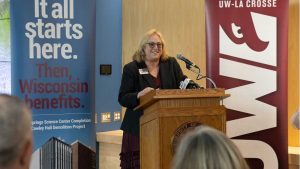Transportation project disects La Crosse
February 18, 2015
Fall semester of 2014 at UW-La Crosse, Associate Professor James Longhurst was recruiting volunteers to collect data in order to apply for national League of American Bicyclists Bicycle Friendly University recognition.
Over this semester and the past few days, a lot has changed in the process of making UW-L and the city of La Crosse a bike and pedestrian friendly city. Longhurst is at it again in helping to increase student representation for the decisions being made.
Longhurst said, “This year there is a big and complex ongoing political fight about transportation in this region. Since I’ve been talking to a lot of students about the safety in pedestrian project there’s two main concerns: safety crossing West Avenue and parking.”
Along with the UW System budget changes that would occur to the Senate bill 21, there would be a change in the requirements for new roads and management of old roads.
Currently, it is required that new streets accommodate pedestrians, bicycles and cars. But if this bill passes, then it would no longer be a requirement to accommodate pedestrians and bikes.
Longhurst said, “The Department of Transportation judges a good road by how it moves cars.”
And by that judgment, West Avenue is a good road.
In 1988, there was a plan titled Alternative 5 VI that would have incorporated building a new road through the marsh and eventually that plan died.
“Last year out of nowhere the state department started talking about restarting that process of planning, which has resulted in a year long planning process called the Coulee Region Transportation Study,” Longhurst said.
The Coulee Region Transportation Study, Planning and Environment Linkages (PEL), is attempting to solve issues that occur between I-90 and US 14/61.
The draft goal for this plan is to “improve vehicular and multimodal travel and safety in a manner that accommodates economic development, incorporates community plans, contributes positively to the area’s quality of life, and limits adverse environmental and social effects to the extent practical.”
That plan is taken from the State’s Department of Transportation website and has had zero student involvement in its decisions. The City of La Crosse is going through similar planning processes, yet they have scheduled meetings that allow citizen’s involvement.
These meetings take place on Feb. 23 and Feb. 26 at 7 p.m. at the Myrick Center.
Longhurst said, “Students should be aware of a lot of things changing potentially about how students can get to campus, commuting but also transit of the buses, environmental impact on the marsh and the city of La Crosse, in general.”
The City describes their plan in an alternative way and is described as “developing a vision that clearly articulates how the community wants their transportation system to look like in five, twenty, and even fifty years from now.”
The proposed cost for the Coulee Region Transportation project is $140 million.





